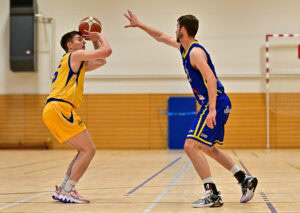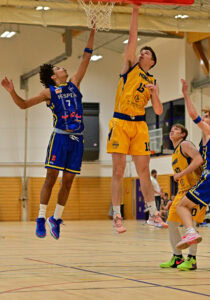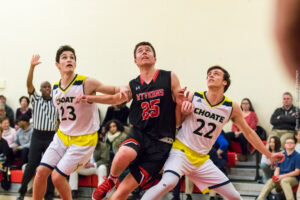November 14, 2024
Shooting Star
Luxembourg, nestled in the crossroads of Belgium, France, and Germany, and one of the world’s smallest countries, is known for its castles, Judd mat Gaardenbounen (pork and beans), superb rieslings and Gewurztraminers, and notorious tax loopholes. Perhaps less known are the 24 basketball teams in the Federation Luxembourgeoise de Basketball (FLBB). Jackson Meshanic ’18 plays small forward for one of those teams: Avanti Mondorf.
After earning All-American and Player of the Year in the Liberty League, where he played for Hobart and William Smith Colleges, the 6’6” Meshanic had agents and general managers ringing his phone off the hook with offers to play in Europe.

“These international scouts look at your film and spot potential,” Meshanic said.”With rookies, they are keeping an eye on the All-American watch lists and conference teams; they watch a few games and develop a short list.”
After several back-and-forth phone calls during which European coaches assessed Mechanic’s character, Avanti Mondorf’s coach offered Meshanic a contract to play in Luxembourg this past season.
Football may be Europe’s number-one sport, but basketball is now a comer. The sport was introduced to the continent between 1910 and 1920, and, by 1936, basketball had become an Olympic sport. Since then, basketball has gained increasing traction in Europe, churning out notable NBA talent such as Serbia’s Nikola Jokic, Slovenia’s Luka Doncic, Greece’s Giannis Antetokounmpo, and Lithuania’s Domantas Sabonis.
There are some significant differences in the style of play between U.S. and European teams. The Europeans rely on team-oriented play rather than an individual all-star. Meshanic took to the new style of play with ease.
“Many times, the European teams will bring in Americans to make plays for the European guys who are fundamentally sound,” he said. “From what I’ve observed, Americans have more skills with the ball but sometimes have a lower basketball IQ. All the European players have a very high basketball IQ and are very team-oriented, whereas in the U.S., there are many more one-on-one and isolation plays.”
Meshanic’s day consists of basketball and then some more basketball. After waking up at 9 a.m., he heads to the team’s facilities, takes a cold plunge, and jumps into the sauna. He usually lifts for an hour in the morning, returns to his apartment for a bite, and then trains with the team from noon to 1 p.m. Then, there’s another night practice for two hours. All this practice leads to two weekly games—one midweek and one on the weekend.

And if all this sounds grueling, Meshanic has had years of practice.
Always a self-described big kid, Meshanic began playing basketball in second grade on his town’s rec team and continued to pound the boards to seek more competitive play as he went through school. By the time he was in eighth grade, Meshanic was leaps and bounds more proficient with the ball than his teammates. As his height spurted to a vertiginous 6’5”, he turned his game up a notch in his sophomore year, where he played on the E.O. Smith High School varsity team in Storrs, Conn., pivoting to the position of power forward instead of center.
Meshanic transferred to KO in his junior year and trained with KO’s varsity boys’ basketball coach, Brad Seaman, who saw Meshanic’s talent and discipline. Seaman trained Meshanic on the side, leveling up his game. QUOTE FROM BRAD
“At this point, I started to dedicate more and more time to basketball and training over the summer,” Meshanic said, “and decided I wanted to play in college.”
At this point in his career, Meshanic felt he wasn’t quite ready for Division I and committed to D3 Hobart. By the end of the ’21-’22 season in his junior year, with impressive stats (averaging 15.9 points, 8.9 rebounds, and 1.6 assists), he could well have entered the transfer pool and headed to a D1 school, but then he would have missed the opportunity to play ball on the same team with his twin brothers, Carter ’21 and Hunter ’21.
“That was a dream come true,” Meshanic said of the experience playing college ball with his brothers. “We had talked about that forever, and I encouraged them to come play with me at Hobart. I know brothers sometimes can get really competitive, but my brothers are probably my two best friends in the world.”
Meshanic is so devoted to his brothers that a few days before this interview, he was up at 3:00 a.m. in Europe watching them win the Liberty League Championship on television.
“I will treasure those two years I had with them for the rest of my life,” he said.
Despite the time difference and 3,684 miles separating them, the Meshanic family remains close, and his parents have visited him in Luxembourg to watch him play. His transition to European living has been relatively smooth, as most of his teammates speak English. He is one of only three Americans on the team because European ball only allows three Americans to play per team. Avanti Mondorf has two Spanish players, and Meshanic converses with them in Spanish. He is learning French for 30 minutes daily on his phone so that traveling through Luxembourg is easier.
“I like to learn new languages,” he said. “I also feel it’s rude, and it’s a stigma that we Americans only speak English.”
Having traveled to Europe and South America several times, Meshanic has an advantage and doesn’t experience the ribbing from teammates that less-peripatetic Americans have. In fact, Meshanic said he actually prefers living in Europe over the U.S. due to the cross-cultural winds that blow across the country. Luxembourg’s population, though only 660.809, includes people of 180 different nationalities.
“There’s such a blend of cultures that you can learn new things from everyone around you,” he said. “Here, there are so many different languages and different people, which is really interesting to me. It forces you to go outside your comfort zone, which is something that doesn’t always happen to you in Connecticut.”
He attributes his respect for different cultures and openness to exploring new experiences to his time at KO. Learning history from faculty member Peter Jones while at KO allowed him a greater perspective and understanding of the worldview of Europeans, particularly about the threat of Nazism.
“KO forced me out of my shell and do things that I wasn’t super comfortable with,” he said. “I remember sitting at the Harkness table and knowing I would have to participate or fail. All those experiences in this small school environment force you to stay on top of your game. By the time I was a senior, I knew everyone on campus.”
“Moving to Europe, I’m basically on my own,” he said. “I don’t have any life-long friends to fall back on, but I don’t feel really nervous. A lot of that has to do with KO. I just feel like I grew up there.”
Meshanic’s visa expires at the end of May, and he will return to the States and reassess his options with his agents. Although playing pro ball is every player’s dream, Meshanic said a pay raise would be nice. Of course, competing in a professional league in the U.S. is always an end goal, and Meshanic feels it is attainable if everything falls into place.
“A lot of things would have to go right for me to get a G league tryout because you need a certain level of natural athleticism,” he said. “I have enough if I’m perfect in everything else. It’s a stretch, but that’s the goal.”
So, for now, Meshanic’s future is wide open—a perfect opportunity to take his shot.
Athletes Main News
